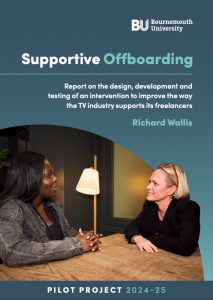 Academic research in the creative industries often identifies real-world challenges. We’re interested in inequalities, structural gaps, working conditions, management practices and much beside. But translating those insights into practical change isn’t always straightforward. So when The British Academy awarded me an Innovation Fellowship last year, I was able to use my time to develop a modest but tangible intervention that attempted to do both: contribute to scholarly thinking on freelance labour, and offer something of genuine value to people working in TV.
Academic research in the creative industries often identifies real-world challenges. We’re interested in inequalities, structural gaps, working conditions, management practices and much beside. But translating those insights into practical change isn’t always straightforward. So when The British Academy awarded me an Innovation Fellowship last year, I was able to use my time to develop a modest but tangible intervention that attempted to do both: contribute to scholarly thinking on freelance labour, and offer something of genuine value to people working in TV.
It’s called Supportive Offboarding. The core idea is simple. When a freelance contract ends, the employer offers a short, structured conversation with someone at arm’s length from the show. The purpose isn’t to assess the freelancer’s performance, or simply to extract feedback for the employer. Instead, the conversation focuses on reflection, appreciation, and a forward-looking discussion about career goals and next steps. In other words, it’s about support, not surveillance.
The project emerged from ongoing research into freelance working cultures in screen production which has been the focus of much of our work at the Centre for Excellence in Media Practice (CEMP). What we have discovered is that while much attention is given to how people enter the TV industry, far less thought is given to the sustainability of those careers. Most work in this sector is contingent, based on short-term contracts. The way they end, and freelancers move on, shapes their sense of professional identity, belonging and ultimately, their inclination to remain in the industry. Offering no feedback, taking no interest in their future, asking for no feedback, and sometimes forgetting to even say thank you, can compound feelings of disposability.
To test the intervention, we partnered with the media conglomerate, Fremantle, responsible for shows like Britian’s Got Talent, The Apprentice, and The Rap Game. We even included the Australian soap, Neighbours as part of our study. Freelancers were invited to take part in offboarding conversations. Responses were overwhelmingly positive. For many, it was the first time they had been offered structured space to reflect on a production once it had ended.
From a research perspective, this was as much about method as it was about findings. The process was co-designed with industry partners, shaped by production constraints, and aimed at practical feasibility. Our challenge wasn’t just to analyse a problem but to create something that might be adopted in live settings: something simple, repeatable, and valuable. What this project affirmed for me is that meaningful collaboration between academia and industry is not only possible but it can produce benefits for both. Research doesn’t need to sit at a distance from practice. It can help to shape it.
My report, Supportive Offboarding: Report on the design, development and testing of an intervention to improve the way the TV industry supports its freelancers (https://doi.org/10.18746/shkc-1383) is published this week.
 Research into supporting TV freelancers: presentation of key findings
Research into supporting TV freelancers: presentation of key findings










 New Nepal scoping review on maternal & neonatal health
New Nepal scoping review on maternal & neonatal health Fourth INRC Symposium: From Clinical Applications to Neuro-Inspired Computation
Fourth INRC Symposium: From Clinical Applications to Neuro-Inspired Computation Writing policy briefs
Writing policy briefs Upholding Excellence: The Concordat to Support Research Integrity
Upholding Excellence: The Concordat to Support Research Integrity ECR Funding Open Call: Research Culture & Community Grant – Application Deadline Friday 12 December
ECR Funding Open Call: Research Culture & Community Grant – Application Deadline Friday 12 December MSCA Postdoctoral Fellowships 2025 Call
MSCA Postdoctoral Fellowships 2025 Call ERC Advanced Grant 2025 Webinar
ERC Advanced Grant 2025 Webinar Horizon Europe Work Programme 2025 Published
Horizon Europe Work Programme 2025 Published Horizon Europe 2025 Work Programme pre-Published
Horizon Europe 2025 Work Programme pre-Published Update on UKRO services
Update on UKRO services European research project exploring use of ‘virtual twins’ to better manage metabolic associated fatty liver disease
European research project exploring use of ‘virtual twins’ to better manage metabolic associated fatty liver disease